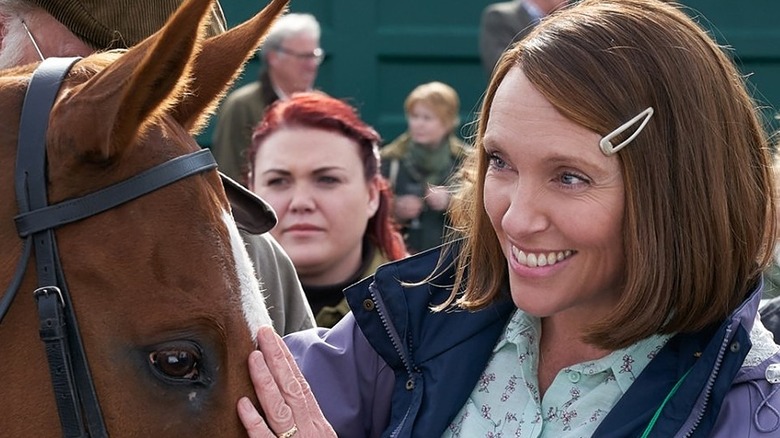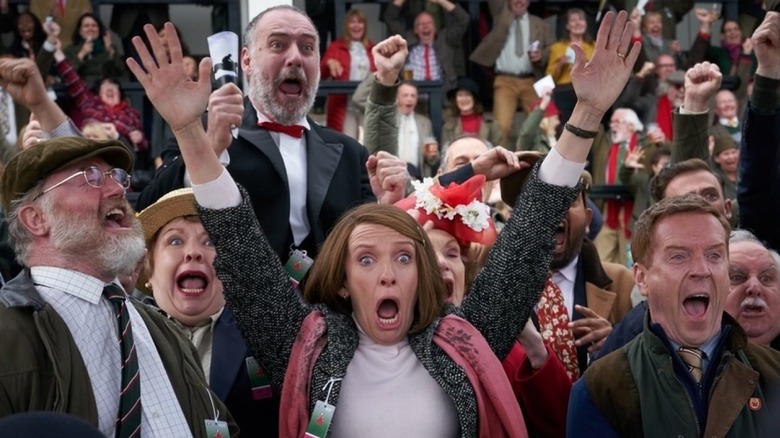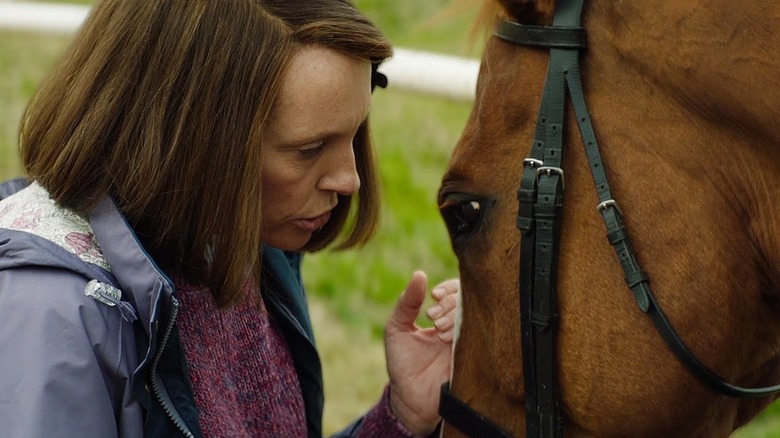Dream Horse Review: Clichéd, But Extremely Charming
Most sports movies based on true stories have to play fast and loose with the facts to fit the classic underdog narrative, but every now and again, there's an against-all-odds triumph that feels like a movie plot come to life. That was certainly the case with Dream Alliance, a racehorse bred by a barmaid with no prior experience, who was jointly owned by a poverty-stricken community in the South Wales Valleys who all chipped in £10 a week to ensure he could get trained for races. Dream Alliance went on to perform strongly in several high-profile races, much to the ire of the highly experienced trainers he beat; it all made for the kind of underdog story that captures the attention of film producers looking for the next unlikely crossover hit with "feel-good movie of the year" potential.
Whether "Dream Horse" will scratch that itch remains to be seen, but it's hard not to come away from it feeling charmed. There's nothing in the film that will surprise a single person who sees it, the true story so close to the most clichéd sports movie narrative possible you can see the inevitable twists and turns from a mile off. But despite how familiar it all feels, it has an infectious likability. More cynical viewers will be surprised at just how quickly they go from rolling their eyes at every overplayed underdog sports movie trope to becoming surprisingly invested in the town's quest to transform Dream Alliance into an unstoppable race winner. Trust me, I was one of them.
A Story about a community - and barely about a horse
Toni Collette stars as Jan Vokes, who spends her days working in a supermarket and her evenings working as a barmaid in the local pub. One day at work, she overhears affluent tax advisor Howard Davies (Damian Lewis) telling friends about his previous experiences owning a racehorse, and becomes immediately invested in the idea of getting her own. Along with husband Brian (Owen Teale), she starts researching, but the pair quickly realize that they don't have the money or the experience in order to get one. So Jan develops a new idea: form a syndicate within the town community, to all chip in £10 (approximately $14) a week, which can ensure they can train a horse ready for races. They may not get their money back, but they're all happy to take part — and here, the dream alliance is born.
If this plot synopsis sounds much heavier on the specifics of how the town came to invest in a racehorse, and very light on the actual horse racing itself, then this is by design. Unlike previous blockbuster films based on the successes of Seabiscuit and Secretariat, the training of Dream Alliance barely factors into the story, with the races themselves being framed entirely as a victory for the community, rather than the horse they're rallying around. Horse racing fans expecting some high-stakes racing may come away disappointed, with more time in those sequences spent watching the syndicate in the spectator's stands. Eventually, it becomes clear that the focus of this against-all-odds story isn't the racehorse who was trained into becoming a champion, but a working-class community getting a solid return on their initial investment. The film remains charming, painting a picture of a close-knit community with a plethora of kooky characters, but it does often feel like we're not getting the full picture as a result — the dream horse being at the center of the characters' attention, but never at the center of the story.
This approach makes more sense when realizing this story has already been told on the big screen in the Sundance Prize-winning documentary "Dark Horse: The Incredible True Story of Dream Alliance." As is the case with "Dream Horse," the story of the town coming together was central to the narrative, as was the elitist snobbery they received for their attempts at trying to breed and train a champion racehorse. "Dream Horse" may tone down this inherently political criticism of how working-class people are treated when trying to win in a millionaire's sport, but it's still there. Rather than scoring a get-rich-quick investment, Jan eventually finds herself back working the same two minimum-wage jobs to fund the horse's veterinary care, in scenes that will likely remind viewers of Homer working two jobs to pay for Lisa's pony in "The Simpsons." The bite of its political commentary has been softened for broad appeal, but it does still give the film some stakes beyond the expected ups and downs of an underdog sports tale.
Cliched - but very hard not to like
It's clear the residents of the town are more than happy to have their story retold on the big screen, as they appear alongside the cast for a karaoke rendition of "Delilah" by Tom Jones as the end credits roll (I promise I am not making this up). This, of course, comes immediately after a postscript telling the audience about Dream Alliance's retirement from racing — the clearest sign that the audience is intended to leave the film not thinking about the horse at the center of the narrative, but the quirky community who put their heads together to fund his training. This only raises the question of whether this film adds anything new to the narrative; after all, the community's story has already been told onscreen via their testimony before, albeit in a narrative that didn't condense more than a decade's worth of training and races into what appears to take part over the course of a single year. The film is extremely likable, with a solid amount of laughs, and the rare sight of an A-list actor from somewhere outside of the UK managing to pull off a Welsh accent. But if their real-life counterparts are equally as affable as they appear in their brief onscreen cameos here, you will find yourself questioning why you didn't just spend time with them via their documentary instead.
The film marks the directorial debut of TV director Euros Lyn, who has previously worked on international phenomenons such as "Doctor Who," "Sherlock," "Black Mirror," and most recently "His Dark Materials." Despite his high-profile credits in sci-fi and fantasy series, he's decided to go back to his roots for his debut, making a star-studded film in his native Wales, where he got his first small-screen credits in the late 1990s. This may be why, despite the abundance of clichés, the film still has an air of authenticity to it — there are some larger-than-life characters in the town, but their depiction here doesn't feel like the product of an outsider heightening them to become the butt of the joke. It may also be why the film is as attuned to their economic woes as it is; it may trade in dramatic Hollywood clichés, but the depiction of their struggles doesn't feel divorced from their reality.
"Dream Horse" cares less about the horse and more about the community rallying around it, but when it's as charming as this, it barely matters. It eventually wears out its welcome, but for the most part, this succeeds as a crowd-pleaser, even as it never evolves beyond the clichés you've come to expect from an underdog sports drama.


